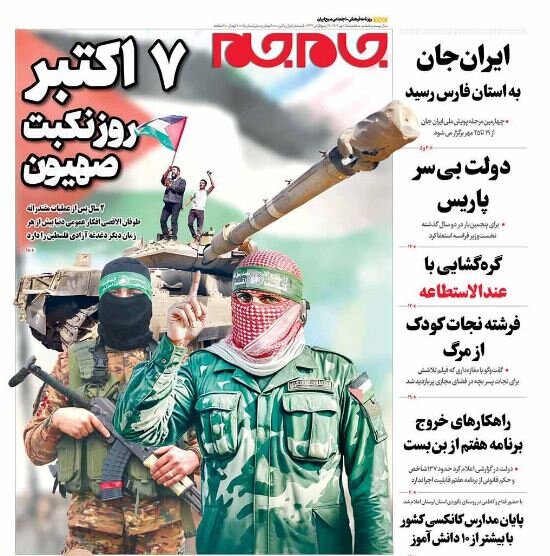The West’s violations of commitments hit record high

TEHRAN - In an article, Jam-e-Jam addressed the West's endless breaches of commitments, including the nuclear inspection agreement signed between Iran and the International Atomic Energy Agency (IAEA) in Cairo, Egypt, on September 10.
It wrote: The history of Iran's negotiations with the West in recent years is full of deceit and breach of commitments, from betraying the JCPOA to burying the Cairo Agreement. The massive Israeli and American airstrikes on Iran, two days before the fifth round of indirect talks between Tehran and Washington, were a fatal blow to diplomacy. More than 120 countries considered these attacks a clear aggression and condemned them. However, in the post-war atmosphere and following the request of European countries, Iran pursued the path of dialogue with the IAEA to achieve a new framework for limited but targeted inspections, which resulted in the Cairo Agreement. In an official statement, Rafael Grossi, the IAEA director general, called it a practical step to restore trust and said that this agreement demonstrates Iran's good intentions. But the West cut it off with deceit. The Cairo Agreement was designed based on the principle of cooperation, but it only lasted two weeks. The activation of the snapback was the peak of killing diplomacy.
Siasat-e-Rooz: The enemy is always the loser
Siasat-e-Rooz argued in an editorial that the Zionist enemy ultimately remains the loser. It contends that although Israel has achieved some tactical gains against resistance groups and briefly shifted the regional balance, it has not secured decisive victories in Gaza: it has neither freed prisoners held by resistance forces nor defeated Hamas, nor fully occupied the territory. Resistance, the editorial maintains, continues across the region. The piece adds that efforts by hostile states and groups to disarm Hezbollah have failed, Iran emerged victorious in the 12-day June war, and Yemen continues to unsettle Israel. Taken together, these developments, it argues, show that Israel is in a critical position. Given events in Palestine, the editorial concludes that countries must strengthen themselves because negotiations and compromise yield no results; as evidence, it cites attacks on Iran by Israel and the United States during ongoing talks between Iranian and American diplomats. Ultimately, it calls for a new world order—abandoning capitalist-driven unilateralism in favor of fair multilateralism to overcome the current crisis.
Ettelaat: Will China remain a customer of Iranian oil after snapback sanctions?
Ettelaat examined Iran’s oil sale after the activation of the snapback sanctions in an interview with energy expert Mahmoud Khaghani. He said: The return of international sanctions against Iran has caused many doubts about the country's income because when the amount of trade with other countries declines, dollar income decreases by the same amount, and as a result, financial irregularities increase. Today, most of Iran's oil is purchased by private refineries in China. In fact, so far these refineries have not been directly affected by the White House's (secondary) sanctions as they have not extensive relations with the United States. China always defends its national interests, therefore, if Washington puts pressure on Beijing or offers the Chinese greater benefits in the form of a deal, it is likely that China would give up oil imports from Iran. Therefore, the ruling system must seriously revise its oil policy so that a change in foreign policy developments or equations in the international system cannot easily affect our oil income.
Arman-e-Melli: Cairo Agreement in an ambiguous situation
In a commentary, Arman-e-Melli addressed the ambiguity of the Cairo Agreement and wrote: During the negotiations between our country's Foreign Minister Araghchi and Grossi, hosted by Egypt, the sides reached the Cairo Agreement for resuming cooperation. After the Cairo Agreement, Araghchi said this agreement was intended to prevent the activation of snapback, and if the Europeans do not take into account this goodwill by Iran, the Cairo Agreement with the Agency will practically lose its meaning. However, we witnessed that the Europeans, despite Iran's goodwill, continued their own course and moved towards activating snapback sanctions since they did not have permission from their “older brother”, the United States. It seems that in such a situation, where the West is making exaggerated claims instead of constructive approaches, and Iran, in turn, is saying that the agreement with the Agency is ineffective, the only way to change the conditions is to resume negotiations, and there is no other way. The Europeans themselves are also aware that no amount of pressure on Iran will be effective, and ultimately, they must sit down at the negotiating table with Iran.
Leave a Comment